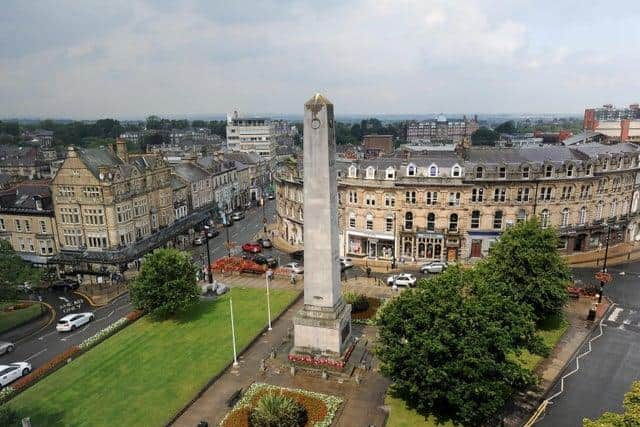This is what a North Yorkshire ‘super council’ could look like - and what a devolution deal could mean for Harrogate
and live on Freeview channel 276
Council leaders across North Yorkshire have been given just two months to come up with plans for what they think the new council - a combined authority - should look like in what is set to be the biggest shake-up in local government in a generation.
If successful, new powers and millions of pounds in funding will be handed down from Westminster to an elected metro mayor - similar to how Greater Manchester and Merseyside operate.
Advertisement
Hide AdAdvertisement
Hide AdMinisters, however, have said that a deal in York and North Yorkshire is one that will have to come at a significant cost - the disbandment of the region's seven district councils, including Harrogate.


What could a devolution deal look like?
A devolution deal for York and North Yorkshire would see all of its seven district council's scrapped to make way for one or two combined authorities which would operate across the region's traditional council boundaries.
It is understood that one supersize authority to cover all of York and North Yorkshire's 800,000 residents would be far too big - and ministers are leaning towards the idea of two combined authorities.
They would bring council services - such as education, highways, social care, transport planning, licensing, waste and council tax collections - under the control of one umbrella organisation.
Advertisement
Hide AdAdvertisement
Hide AdAnother feature of devolution is the so-called metro mayor, who is visible and accountable to those they represent.
Examples of metro mayors include Dan Jarvis in Sheffield and Andy Burnham in Manchester.
If a deal goes ahead, York and North Yorkshire too would most likely get a new mayor.
Why is devolution needed?
Advertisement
Hide AdAdvertisement
Hide AdPapers going to local councillors for consideration suggest that a devolution deal for York and North Yorkshire could potentially unlock significant investment over 30 years.
Leaders have also argued devolution would mean the region has greater control of investment into the region and could accelerate recovery from Covid-19.
Proponents of devolution say decisions are best made by local council leaders rather than remote officials in Whitehall, who may have little to no understanding of the challenges in that area.
What have council leaders been saying so far?
Local councils have unanimously agreed to the idea of a devolution.
Advertisement
Hide AdAdvertisement
Hide AdCoun Richard Cooper, leader of Harrogate Borough Council, said: "Along with our colleagues at North Yorkshire County Council what I think we need to address is making sure decision making is not affected. I don't want to see any Harrogate Borough Council services downgraded or not improved in any future arrangements.
"All the other districts are in the same situation so clearly what we need now is effective voices and governance. We have got to fight our corner - but we will work with others.
"I will be very sad to see Harrogate Borough Council go. I have been a member since 1999 and leader since 2014, but I have always said through the years I will raise my hand to abolish the council if it means better services for the local people."
Advertisement
Hide AdAdvertisement
Hide AdCoun Carl Les, the leader of North Yorkshire County Council, added: “Linking strong devolution deals to unitary status is the challenge the government has issued.
“We are at a critical time for our county and region and can see the positive opportunities to simplify structures and access to high quality services, strengthen our economy and voice nationally to lobby for greater investment and save significant sums of money.”
What is happening now?
We are now at the stage where leaders from each of the local authorities across York and North Yorkshire are considering a set of “asks” which are laid out in the devolution proposal.
At meetings taking place throughout July, each local authority is being asked to agree to begin the process of negotiating a devolution deal by agreeing the “asks”.
Advertisement
Hide AdAdvertisement
Hide AdThere are many steps needing to be taken to negotiate a deal – this is the first.
If conversations between the councils and government progress well, a governance review will be required to take place, including a full consultation, which will provide residents, communities and businesses an opportunity to share their views before decisions are made.
Has devolution happened elsewhere?
Since 2018, as a region, York and North Yorkshire has been discussing devolution when leaders across Yorkshire committed to developing a joined-up deal for “one Yorkshire”.
However, the UK government responded to this, making clear they would first prefer smaller devolved deals.
Advertisement
Hide AdAdvertisement
Hide AdSince then, devolution deals have been agreed for South Yorkshire and, in March this year, a deal was agreed for West Yorkshire. York and North Yorkshire deal is the only option currently on the table for our sub-region.
Given the need for our sub-region to work together in response, councils have agreed to explore with the government what opportunities the potential for devolution could bring.
The timetable is still to be set for York and North Yorkshire to make decisions about its own devolution, aiming to take place between 2020 and 2022.
What is the central government’s position on this?
Central government in Westminster has been strongly encouraging the set-up of combined authorities.
Advertisement
Hide AdAdvertisement
Hide AdIn last year's Queen’s Speech, they stated how devolving more decision making to the regions would "unleash regional potential" in England.
And in the Conservative's election manifesto that year, the party promised to commit to “full devolution across England…so that every part of our country has the power to shape its own destiny.”
What happens next?
If the local authorities collectively agree to the set of "asks”, a devolution proposal will be submitted to the government and the process of negotiating a devolution deal will begin.
By Jacob Webster, Local Democracy Reporter